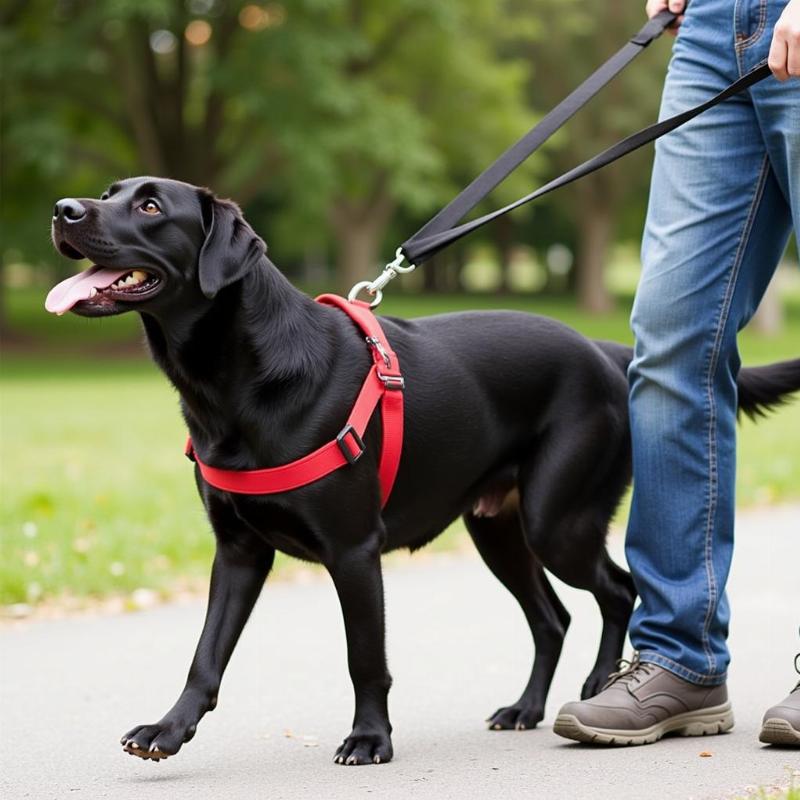A dog harness is more than just a fashionable accessory for your Labrador; it’s a crucial tool for training, walking, and overall safety. Finding the right dog harness for a Labrador, however, can be a daunting task with the sheer variety available on the market. This article will guide you through the process of selecting the ideal harness for your Lab, considering their specific needs and your lifestyle. We’ll cover everything from sizing and fitting to different harness types and the importance of prioritizing comfort and safety.
Understanding Your Labrador’s Needs
Before diving into the different types of harnesses, it’s crucial to understand your Labrador’s specific needs. Are they a puppy still learning leash manners? A senior dog requiring extra support? Or a highly energetic adult who loves to pull? Knowing your Lab’s temperament, age, and activity level will help narrow down the best harness options. A proper fit is essential for comfort and to prevent escape, especially considering the Labrador’s strong build.
Types of Dog Harnesses for Labradors
Several types of harnesses cater to different needs and training goals. Let’s explore the most popular options for Labradors:
-
Front-Clip Harnesses: These harnesses clip at the dog’s chest, discouraging pulling by gently redirecting their attention towards you when they strain on the leash. This type is ideal for training puppies and Labradors who tend to pull.
-
Back-Clip Harnesses: These are a classic choice, offering comfortable control for well-behaved walkers. The leash attaches to a ring on the dog’s back, providing a balanced and even distribution of pressure. They’re a good choice for adult Labradors who walk calmly on a leash.
-
Dual-Clip Harnesses: Offering the versatility of both front and back clips, these harnesses allow you to adjust the control based on your Labrador’s behavior and the walking environment. This adaptable style is particularly beneficial for Labradors who are still in training or have varying walking habits.
-
No-Pull Harnesses: Designed specifically to deter pulling, these harnesses often feature a tighter fit and strategic pressure points to discourage pulling without causing discomfort. They can be an effective solution for persistent pullers.
Sizing and Fitting Your Labrador’s Harness
A properly fitted harness is vital for your Lab’s comfort and safety. Measure your Labrador’s chest girth (around the widest part of their rib cage) and neck circumference. Refer to the manufacturer’s size chart for each specific harness to ensure a snug but not restrictive fit. You should be able to fit two fingers between the harness and your dog’s body.
Material and Durability
Labradors are known for their energetic nature and love of the outdoors. Opt for a harness made from durable, weather-resistant materials like nylon or polyester. Reinforced stitching and sturdy hardware are also crucial for ensuring the harness can withstand your Labrador’s activities.
Comfort and Safety Features
Padding in key areas, such as the chest and back, enhances comfort, especially for extended walks or activities. Reflective strips or bright colors increase visibility, ensuring safety during walks in low-light conditions.
Training Your Labrador with a Harness
Introducing a harness to your Labrador should be a positive experience. Start by letting them sniff and investigate the harness. Use positive reinforcement with treats and praise while gradually introducing them to wearing it. Once they’re comfortable, attach the leash and begin short training sessions.
 Labrador walking calmly with a harness
Labrador walking calmly with a harness
Expert Insights
“A well-fitted harness can transform your walking experience with a Labrador,” says Dr. Emily Carter, DVM. “It provides better control, prevents strain on their neck, and allows for a more enjoyable walk for both of you.”
“Remember, a harness is an investment in your Labrador’s well-being,” adds certified dog trainer, Mark Johnson. “Choosing the right harness and using positive reinforcement training will create a happy and safe walking experience for years to come.”
Conclusion
Choosing the right dog harness for a Labrador requires careful consideration of their individual needs and your lifestyle. By understanding the different types of harnesses, prioritizing proper fit, and focusing on comfort and safety features, you can ensure a positive walking experience for both you and your beloved Lab. A well-chosen harness not only enhances control but also fosters a stronger bond between you and your four-legged companion.
FAQ
- What type of harness is best for a Labrador puppy? A front-clip harness is often recommended for puppies as it helps discourage pulling and redirects their attention during walks.
- How do I measure my Labrador for a harness? Measure the circumference of their chest at the widest point and their neck. Refer to the manufacturer’s size chart for the specific harness you are considering.
- Can a harness be used for training? Yes, harnesses are excellent tools for training, especially for teaching leash manners and discouraging pulling.
- Are no-pull harnesses uncomfortable for Labradors? When fitted correctly, no-pull harnesses should not be uncomfortable. They use strategic pressure points to discourage pulling without causing pain.
- What material is best for a Labrador harness? Durable, weather-resistant materials such as nylon or polyester are recommended for Labradors, given their active nature.
- How do I introduce a harness to my Labrador? Let your Lab sniff and explore the harness. Use positive reinforcement with treats and praise while gradually getting them accustomed to wearing it.
- Are harnesses better than collars for Labradors? Harnesses are generally preferred over collars for Labradors, as they distribute pressure more evenly and reduce the risk of neck strain.
Related Articles
Beautdogs.us is your premier destination for all things dog-related in the United States. We offer expert advice on dog breeds, care, and product recommendations for a happy and healthy canine companion. Whether you’re a seasoned dog owner or just starting your journey, Beautdogs.us provides reliable information and resources to support your bond with your furry friend. Contact us for expert advice! Email: [email protected], Phone: +1 501-555-7529. Visit Beautdogs.us today!